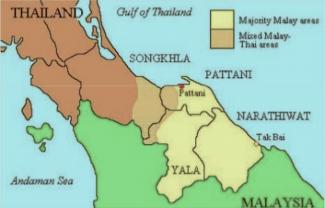Growing Menace: Islamic Militancy in the Troubled Thailand
Thailand had witnessed its bloodiest day in recent history on April 28 this year in which more than 120 suspected militants were killed. Even after almost four and a half month have passed, the country is still reeling under Islamic militancy. Most recently, on August 26 a powerful bomb ripped through a food market in the Sukhirin district of Narathiwat province, bordering Malaysia. Coincidentally the blast occurred on the eve of a Prime Ministerial visit to the area that killed one person and injured at least 30 people. The attack has been considered a setback for the Thaksin Shinawatra government that claimed the April incident as a ‘full stop’ to the Islamic militancy in the country.
A series of deadly attacks in the region has left more than 280 people dead hundreds more wounded since January this year. Regarding the April 28 incident, Government sources claimed that machete-wielding militants under the influence of drug launched a well-coordinated attack on at least 10 security posts throughout the Muslim-dominated southern provinces of Songkhla, Satun, Yala, Narathiwat and Pattani that followed massive encounters and subsequent killings.
In fact, the success of the Iranian revolution in the late 1970s has influenced every Islamic resistance group of the world in some way or the other. Some of the Southeast Asian countries could not remain aloof from this insurgency-wave particularly where Muslims are in a majority. The emergence of Islam as a political force in Malaysia and Indonesia became inevitable in this situation. At the same time, Islamic insurgencies in the Philippines, Southern Thailand, and Aceh kept simmering.
In so far as the Islamic militancy in Southeast Asia is concerned, it has been prominent in the Aceh, and other parts of Indonesia, in Mindanao (Philippines) and in Muslim Rohingyas inhabited Myanmar. In Southern Thailand, there have been various Islamic movements and organizations, small and large, thriving mostly on outside aids and moral support from transborder regions i.e. Malaysian state of Kelantan, located near south Thailand and especially from the Malay opposition party PAS (Parti Islam SE-Malaysia or Islamic Party of Malaysia). This party has long sought to entrench deeply the religious values of Islam in the country’s constitution and in November 1993 secured passage of a law in the Kelantan legislature, which provided for an Islamic penal system. The PAS openly supports the cause of Muslims in Thailand.
Pattani Muslims’ demand to establish an independent Islamic nation dates back to late 1940s when they revolted against the Thai government which was crushed effectively. The Pattani resistance as it is known, shifted its strategy in a more radical way while other Pattani liberation movements like BRN (the Barisan Revolusi Nasional), PULO (the Pattani United Liberation Organisation), which was responsible for sporadic bombings in the 1990s, and GMIP (Gerakan Mujahadeen Islam Pattani) became less operative by the mid-1990s due to poor mass support and weak leadership. However, other movements like the BNPP (Barisan National Pember-Basan Pattani) moved closer to the global currents of Islamist radicalism.
During the late 1970s the BNPP expanded its guerrilla activities against the Thai security forces in the region. In 1985, the more radical and militant elements of the BNPP, led by its Vice-Chairman, Wahyuddin Muhammad, broke away from the parent organization to form the BBMP (Barisan Bersatu Mujahideen Patani or United Mujahideen Front of Pattani). Later in 1986, the BNPP renamed itself as the BIPP (Barisan Islam Pembebasan Pattani or Islamic Liberation Front of Pattani) to appear more committed towards the cause of Islam. Later PULO, BRN and BNPP were overtaken by the BBMP (Barisan Bersatu Mujahideen Patani or United Muhajideen Front of Patani).
Besides the Islamist factor, the government has been trying to shy away from the ground realities like corruption, nepotism, police brutality and violence meted out by the Thai army. After a long time, it has offered millions of dollars for the developmental work in the relatively undeveloped southern region to meet the requirements of the agitated minority. However, things have moved too far. The scourge of Islamic fundamentalism, insurgency and the demand for a separate state appear to be unending even though the Thai government is trying hard to provide solace to the region with a heavy developmental package in the area.
Nonetheless, the Thai government has two long-term problems to resolve— to satisfy the Muslims in the south and to control the PAS in the neighbouring state that is giving moral support to the militants. To much of its relief, recently on July 31, 2004, seven Asian nations led by India and Thailand itself, have agreed to expand their cooperation to fight transnational militancy and crime, pledging to coordinate and exchange information to combat terrorism. While the imposed martial law (declared in January 2004 till September 2004) is still in place, it is to be seen whether the Tashkin government succeeds in reining Islamists forces in the country.
